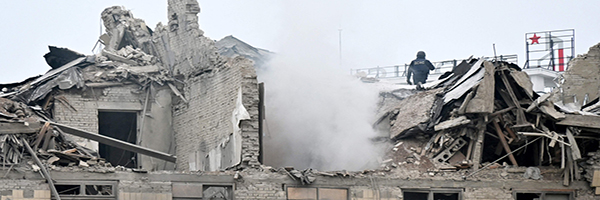US’ supply of long-range rockets pushes Russia-Ukraine conflict toward ‘a nuclear threat’

February 5, 2023 — As Western aid to Ukraine has escalated, Germany’s leader has revealed that Ukraine’s President Volodymyr Zelensky agrees that weapons supplied by the West will not be used to attack Russian territory.
Experts say they believe that such a “commitment” was made to prevent the Russia-Ukraine conflict from becoming a nuclear threat. However, if some countries led by the US continue to break the bounds of “assistance,” the Russia-Ukraine conflict is sure to spin out of control.
On Friday, the US Department of Defense announced a new security assistance package for Ukraine valued at up to $425 million, and another $1.75 billion in support for Ukraine under the Ukraine Security Assistance Initiative.
In a statement issued that same day, US Secretary of State Antony Blinken explained that this package includes critical air defense and counter-drone capabilities to help Ukraine, as well as armored infantry vehicles and more equipment that Ukraine has been making effective use of, including Javelin anti-tank missiles, artillery ammunition, and conventional and long-range rockets for US-provided HIMARS.
The implication of these long-range arms is that Ukraine will have the ability to carry out attacks deeper into Russian territory.
In response, former Russian president Dmitry Medvedev said on Saturday that the supply of more advanced US weaponry to Ukraine will only trigger more retaliatory strikes from Russia, up to the extent allowed by Russia’s nuclear doctrine, according to Reuters.
The NATO bloc led by the US is using a salami-slicing tactic to send increased military aid to Ukraine. This could lead to another downward spiral for the Russia-Ukraine conflict, Cui Heng, an assistant research fellow from the Center for Russian Studies of East China Normal University, told the Global Times on Sunday.
According to AFP, Zelensky has agreed that weapons supplied by the West will not be used to attack Russian territory.
“There is a consensus on this point,” German Chancellor Olaf Scholz said in an interview with the German weekly Bild am Sonntag on Sunday. He also said that such a consensus-based approach “avoids escalation.”
However, experts note that Scholz’s remarks were more of an appeasement to Russia and an attempt to de-escalate tensions as it is unclear whether Ukraine will be able to keep its promise, experts warned.
In an interview on Saturday, Fedir Venislavsky, Zelensky’s representative in parliament, said that “all military installations in Russia from which it is waging its war are legitimate military targets for Ukraine.”
He also said that “any command center in the Russian capital is a legitimate military target.”
Venislavsky added that it is up to Ukraine’s military leadership to decide whether to strike such targets.
“Western support has been upgraded to include rockets with a range of more than 150 kilometers. Actually, this has surpassed the usual attempts and boundaries of aid,” Zhang Hong, an associate research fellow at the Institute of Russian, Eastern European and Central Asian Studies of the Chinese Academy of Social Sciences, told the Global Times on Sunday.
The so-called consensus to not attack Russia is also a message from Zelensky to Europe, Zhang said, noting that this is a “guarantee” of security for Europe. However, now that the US has crossed a line by providing Ukraine with longer-range rockets, other countries may follow suit, which could cause a lot of troubles.
Experts also warned that as the two sides have different definitions of “territory,” it can be predicted that escalation is inevitable and intensity in fighting will increase.
Moreover, the conflict between Russia and Ukraine will not only escalate, but also threaten to spiral out of control. This is decided by Russia’s basic policy on nuclear safety, Zhang warned. If Russia suffered a large-scale attack on its territory, it is possible that it will use a nuclear counterattack.
The spread of ideological radicalization from the US leaves European countries with no choice, experts warned. But concerning the scale of aid, Ukraine is more likely to be defensive in the future and so-called long-range rocket attacks are just a means to exert psychological pressure on Russia rather than a de facto security threat, experts said.
